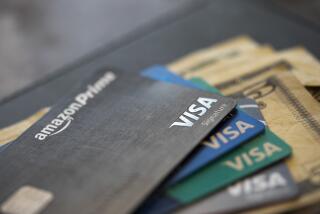Junk Bonds Still Reeling From Drexel Fallout : Securities: Drexel’s bankruptcy plans hit the market hard, but afternoon bargain hunters cushion some of the losses.
- Share via
The bloodied junk bond arena--hardly a market because of a lack of buyers--continued in disarray Tuesday as Drexel Burnham Lambert’s parent firm prepared to file for bankruptcy protection.
Trading in the high-yield, high-risk bonds was light simply because a glut of sellers could not pair off with buyers. As badly as some investors wanted to sell, they couldn’t because no one wanted to buy.
“There is no liquidity. Nobody forces you to give a bid,” said Bruce Eliot, portfolio manager with Houlihan, Lokey, Howard & Zukin, an investment management firm in Los Angeles.
Drexel, which almost single-handedly developed the junk bond market, in the past was critical in providing liquidity by purchasing bonds from sellers even if it had no buyers lined up in advance. But lately it and other firms have declined to do that as the market has softened.
News that Drexel’s parent was headed for bankruptcy court hit the market hard early in the day, as did a bankruptcy filing by Integrated Resources, a major junk bond issuer and Drexel client. Traders said junk bonds dropped initially as much as 3 points, which means their value fell by $30 for each $1,000 in face value.
Traders said some bonds recovered part of their losses in the afternoon as bargain hunters moved in, making for overall drops of about 1 1/2 to 2 points, or $15 to $20 for every $1,000 in face value. Leading the comeback was RJR Nabisco, the tobacco and food company whose bonds are among the strongest performers.
Junk bonds are issued by companies with low credit ratings and pay holders a high interest rate to compensate for the added risk of default. They have fallen the past six months because of financial problems at some major issuers and general fears of a recession. One variation, called payment-in-kind bonds because they pay interest in the form of more bonds instead of cash, have been particularly weak lately.
Traders said a few insurance firms bought Tuesday, as well as companies trying to take advantage of the soft market by buying back their own bonds. Traders said firms that appeared to be buying back their bonds included Caesars World, Revlon Group and National Gypsum.
The sagging market presents companies an opportunity to buy their bonds back at bargain prices, much as a falling stock market sparks companies to buy back their own shares. But buying back junk bonds is limited because many of the bonds carry conditions that prevent companies from buying a large number without making similar offers to all bondholders.
Whether the market will recover soon is increasingly doubtful, and buyers remain scarce.
“It’s been really tough. I have a lot of nervous clients,” said James C. Spirrison, senior vice president in charge of high-yield securities at the brokerage house of Rodman & Renshaw in Chicago.
One reason is the huge portfolio of bonds held by insurance companies, savings and loans, mutual funds and Drexel itself.
Traders shudder when they think of what may happen to the market if Drexel has to liquidate its bond holdings. Mutual funds could come under increased pressure to sell their bonds if more people move their money out of junk bond funds. Insurance firms may come under pressure stemming from concern by regulators about the safety of some companies. And S&Ls;, under a federal law effective last summer, must sell their junk bonds by 1994; many sold early as the market plunged last fall.
“I don’t know if its back is broken, but it certainly is bowed,” said Gregory M. Scott, executive vice president with the Alliance for Capital Access, a Washington lobbying group for companies that issue junk bonds.
HOW JUNK BOND FUNDS HAVE SUFFERED
Performance of some of the largest junk bond mutual funds:
Tues. Total return Fund price Jan. 12 mos. Vanguard High Yield $7.06 -2.10 % -1.84 % Colonial High Yield 5.80 -2.80 % -3.71 % Delchester I 6.27 -2.86 % -3.88 % T. Rowe High Yield 8.24 -2.47 % -5.21 % Kemper High Yield 8.58 -4.43 % -6.52 % Fidelity High Income 6.80 -3.35 % -8.15 % AGE High Income 2.53 -3.44 % -8.80 % IDS Extra Income 3.64 -4.58 % -9.81 % First Inv. High Yield 4.86 -4.21 % -13.02 % Dean Witter High Yield 7.91 -3.43 % -17.94 % Average junk fund -2.74 % -5.29 %
Total return figures through Jan. 31. Prices are net asset values.
Source: Lipper Analytical Services Inc.
SELECTED JUNK BOND PRICES TUESDAY
One point equals $10 per $1,000 face amount.
Bond Tuesday close Change Carolco Pictures (14% due 1993) 87 +7/8 Circle K (13% due 1997) 26 3/4 -2 1/4 RJR Nabisco (15% due 2001) 67 7/8 +3/4 RJR Nabisco (13.5% due 2001) 86 3/4 -1 1/4 TWA (12% due 2001) 43 1/2 +1/2
More to Read
Inside the business of entertainment
The Wide Shot brings you news, analysis and insights on everything from streaming wars to production — and what it all means for the future.
You may occasionally receive promotional content from the Los Angeles Times.








